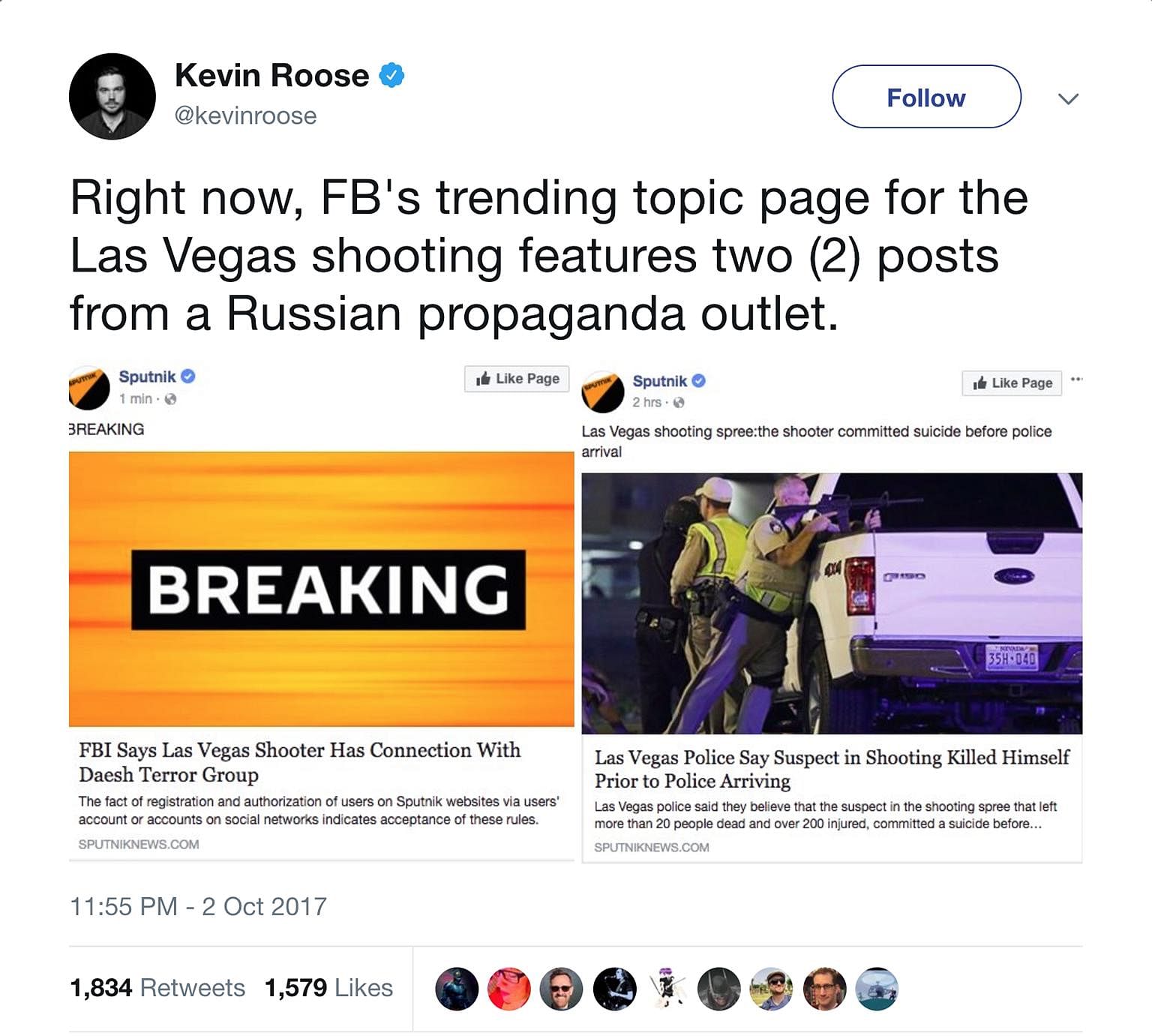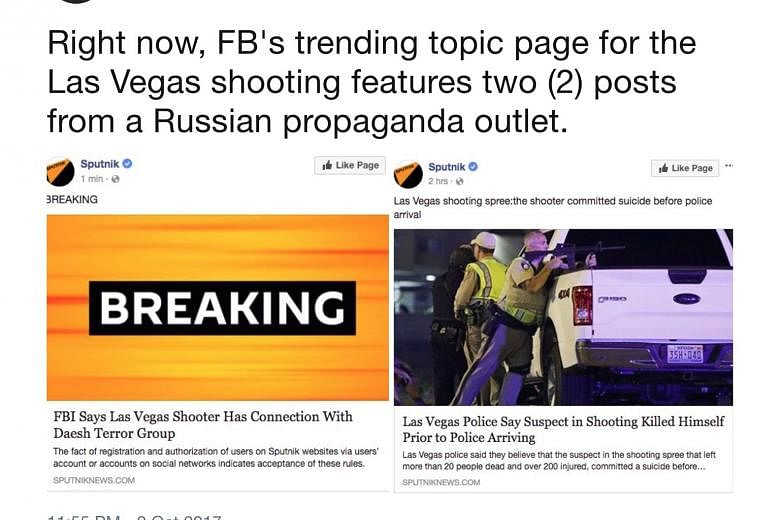Managing and verifying breaking news needs manpower, editorial judgment and sound background knowledge, not algorithms to be a gatekeeper of the news.
Given the reach that Facebook, Twitter and even Google have, and the algorithms they employ, falsehoods spread like wildfire in the wake of the mass shooting tragedy last weekend.
For instance, Facebook's Trending Stories page brought up stories from Sputnik, a site that reportedly has links to Russia.
One trending story, which eventually proved to be false, was that the Federal Bureau of Investigation claimed the shooter was backed by the Islamic State in Iraq and Syria (ISIS).
Another Facebook group - Las Vegas Shooting/Massacre - was started by a man named Jonathan Lee Riches. The Atlantic reported that Mr Riches gained notoriety for filing close to 3,000 frivolous lawsuits while serving a prison sentence for fraud.
He now professes to be an "investigative journalist", a dubious addition to his even spottier resume as a nuclear scientist, an underwear model at Victoria's Secret and a bodyguard at Buckingham Palace.

The group, which quickly gained more than 5,000 members, was a hotbed of misinformation.
One of its gravest transgressions was to wrongly identify the shooter as Geary Danley and by scouring his social media accounts, Facebook likes, family photographs and marital history, the far-right members "proved" he was a liberal who had an agenda against United States President Donald Trump.
Ms Kara Swisher, co-founder of technology news site Recode, said "social media has become totally weaponised", becoming tools for extremist groups and trolls to further their agenda.
We know now that the gunman is Stephen Paddock, a wealthy gambler and retired accountant.
Much of the finger-pointing at the wrong person has been accelerated by Google. Several news organisations said Google's "top stories" results initially brought up stories stemming from 4chan forums, which is tapped mainly by users who revel in hoaxes and misreporting for entertainment.
US journalist Alexis C. Madrigal attributed this development to a tweak in Google's algorithm in 2014 that included non-journalistic sites such as 4chan in its feed.
Facebook and Google acted quickly to rectify the situation.
Google said it would continue to "make algorithmic improvements to prevent this from happening in the future", a spokesman said.
-
NOTABLE TRENDS
-
SNEAKY TODDLER STEALS PRINCE HARRY'S POPCORN: An adorable video of a young popcorn thief working her magic at the Invictus Games in Toronto came up as the top non-music YouTube video this week.
LAS VEGAS SHOOTING: The tragedy that left at least 58 dead at the Route 91 Harvest festival on Oct 1 was the top Google search term.
GOOGLE PIXEL 2: The search giant's latest flagship phone created a huge buzz online. It will be available to consumers here later this year.
Facebook said it spotted the problematic posts after they became popular and removed them. The social media giant announced more measures in a blog post last Thursday, saying it is testing a new feature that will allow users to get more context about a news source. This "button" will pull relevant information across Facebook and other sources such as Wikipedia and display them to the user.
"Helping people access this important contextual information can help them evaluate if articles are from a publisher they trust, and if the story itself is credible," the post said.
But are these measures enough?
Fake news has been accelerated by the vast reach these platforms have in an increasingly interconnected world. For too long, many of these technology companies saw their sole purpose as growing their business.
The thinking may have shifted.
Facebook founder Mark Zuckerberg recently asked for forgiveness for the "ways (his) work was used to divide people rather than bring them together".
Google chief Sundar Pichai told The Verge last week that "getting things right" was a key priority.
"I view it as a big responsibility... I think we'll be able to do these things better over time... Today, we overwhelmingly get it right. But I think every single time we stumble. I feel the pain, and I think we should be held accountable," he said.
But there are two other linchpins in this equation. One is that trusted news organisations need to be given the resources to be able to fulfil their role - that is, to provide news that has gone through the rigorous checks missing in many alternative sites that thrive and profit on spreading shocking lies.
The other is to increase media literacy among readers through continued education.
All the measures, technology and resources being pumped into ensuring that accurate news is being circulated will simply fail in the face of a user who just clicks on any random, unsourced article that just adds to the confusion.


